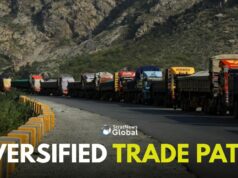As Ukraine marks the fourth year since Russia’s “special military operation” began, the prospect of peace remains clouded by geopolitical maneuvering, strategic ambitions, and the harsh realities of war.
In an interview to the Gist, Professor Amit Gupta, Senior Advisor to the Forum of Federations, sheds light on the evolving dynamics that could either steer Ukraine toward peace or prolong its suffering.
At the heart of the current peace efforts is U.S. President Donald Trump’s ambitious plan.
According to Gupta, Trump’s strategy revolves around three interconnected goals: slashing U.S. defence expenditure by 50%, negotiating a nuclear arms reduction treaty with Russia and China, and brokering peace in Ukraine. By achieving peace in Ukraine, Trump believes he can build the trust needed for arms control agreements and justify significant defence budget cuts—mirroring the post-Cold War “peace dividend” of the early 1990s.
However, Trump’s approach has bypassed traditional European stakeholders. Frustrated by Europe’s perceived inaction, Trump turned directly to Russia, with Saudi Arabia surprisingly stepping in as an “honest broker.” This sidestepping of Europe underscores America’s broader strategic pivot: resolving the Ukraine conflict to focus on China as the primary long-term competitor.
One potential turning point Gupta highlighted is the possibility of a high-profile summit on May 9th—Russia’s Victory Day. Speculation abounds that Trump might join Xi Jinping and Vladimir Putin, creating what some are calling a “second Yalta.” Such a meeting could reshape global alliances, with Russia returning to regional power status and the U.S. and China easing tensions in the Pacific.
But peace remains elusive due to deep-seated distrust. Russia views Ukrainian President Volodymyr Zelenskyy as illegitimate, citing the absence of wartime elections. They fear any deal signed by him might unravel under future leadership, especially after past disappointments with the Minsk Accords. The potential outcomes for Zelenskyy range from comfortable exile—rumors suggest villas in Florida or Italy—to the grim possibility of a coup.
Tragically, the human cost continues to mount. Gupta estimates that nearly half a million Ukrainians and a similar number of Russians have been killed or injured. If the eventual peace deal leaves Ukraine without reclaiming lost territories, Ukrainians might question the sacrifices made.
Rebuilding Ukraine poses another daunting challenge. The World Bank estimates reconstruction costs at $524 billion, while Zelenskyy claims it could reach $700 billion—a figure inflated by the country’s high corruption levels. Europe’s suggestion of an annual $25 billion fund spread across NATO nations seems plausible, yet Gupta remains skeptical. “History shows that once peace is declared, the world moves on—as they did with Afghanistan, Vietnam, and Rwanda.”
Adding complexity are Ukraine’s vast reserves of critical minerals—lithium, uranium, and other rare earths—which Trump has reportedly leveraged in negotiations. While his initial demand for 50% of Ukraine’s mineral wealth seems exaggerated, Gupta believes it’s a bargaining tactic. More realistically, Trump seeks partial mining rights, enough to claim a victory for his domestic base.
China’s role looms large. As Gupta explains, Beijing is well-positioned to invest in Ukraine’s reconstruction through its Belt and Road Initiative. Their expertise in infrastructure development—proven across Africa and Asia—could accelerate Ukraine’s recovery. In contrast, American involvement might be limited to military aid and select economic interests.
The potential Trump-Putin-Xi alignment would inevitably impact India. Russia, disappointed by Europe’s sanctions, has already pivoted toward India and China. Moscow has offered advanced defence systems to India, while China has shifted focus from border tensions to economic collaboration. Gupta notes the rising presence of Chinese brands like BYD and Haier in India, signaling deepening economic ties.
Ultimately, Ukraine stands at a crossroads. Peace might come through backchannel deals brokered by unlikely partners, but the price will be steep—both in territorial concessions and long-term geopolitical realignment.
Without sustained investment and genuine commitment from global powers, Ukraine risks becoming yet another forgotten conflict, its scars etched into history but ignored by the world. Watch the full interview here to learn more about the various factors at play in Ukraine, Russia and the U.S, and how they could redefine the world order as we know it.
In a career spanning three decades and counting, Ramananda (Ram to his friends) has been the foreign editor of The Telegraph, Outlook Magazine and the New Indian Express. He helped set up rediff.com’s editorial operations in San Jose and New York, helmed sify.com, and was the founder editor of India.com.
His work has featured in national and international publications like the Al Jazeera Centre for Studies, Global Times and Ashahi Shimbun. But his one constant over all these years, he says, has been the attempt to understand rising India’s place in the world.
He can rustle up a mean salad, his oil-less pepper chicken is to die for, and all it takes is some beer and rhythm and blues to rock his soul.
Talk to him about foreign and strategic affairs, media, South Asia, China, and of course India.




